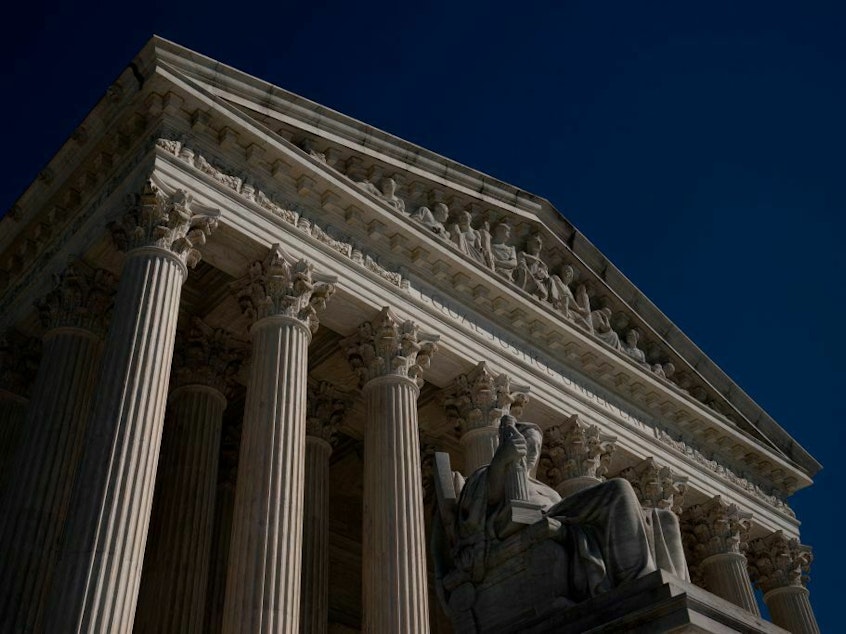Supreme Court conservatives seem divided in major religion case

The U.S. Supreme Court heard arguments Tuesday in a case testing how far employers must go to accommodate the religious views of their employees.
Federal civil rights law requires employers to reasonably accommodate the religious beliefs of workers as long as that accommodation does not impose an "undue hardship" on the employer's business.
Nearly a half-century ago, the Supreme Court defined an undue hardship as a substantial additional cost, but it also said that the cost need not be more than a de minimis amount, defined in the dictionary as a trifling amount.
That language has long angered religious groups of all kinds. And now they are pressing the conservative Supreme Court supermajority to overrule or modify its prior ruling.
Former postal worker Gerald Groff, an Evangelical Christian, brought the case after the postal service signed a contract with Amazon to deliver packages all seven days of the week. Groff was a carrier associate in rural Pennsylvania assigned to fill in delivery gaps when more senior carriers were absent, and the new contract meant he could no longer take off every Sunday. He eventually quit his job and sued the postal service for violating his religious rights.
Sponsored
At Tuesday's argument, Justice Sonia Sotomayor noted that at Groff's small post office of three carriers, others had to pick up the burden when he could not work.
"He was required to work Saturday, Sundays and holidays, and now he doesn't want to work half the days he was hired to work," Sotomayor said.
Justice Brett Kavanaugh focused on the language in the court's 1977 decision that said an employer would suffer an undue hardship if a religious accommodation would impose substantial additional costs on the employer. That, he suggested, seems to be what happened in Groff's small postal office when he refused to work Sundays or religious holidays.
"You had one employee quit, one employee transfer and another employee file a grievance as a result of what Mr. Groff was receiving in terms of treatment," Kavanaugh said.
Justice Elena Kagan also stressed the significant burden on other workers when one is allowed to refuse work. And Kavanaugh noted that other workers may wish to attend religious services on Sundays, too, though their religions may not require that they don't work on Sunday.
Sponsored
Justice Samuel Alito suggested that it wouldn't cost the postal service that much money to pay an extra dollar an hour to hire someone else for those days. But Solicitor General Elizabeth Prelogar, representing the postal service, replied that under the union contract, premium wages are time-and-a-half.
Replying to concerns about morale in the workforce, lawyer Aaron Streett, representing Groff, said that morale would have to be bad enough to affect the efficient operation of the business.
"Give me an example of when the effect on coworkers would do that?" Justice Amy Coney Barrett asked.
"Well," Streett responded, "when a coworker quits would be an obvious example."
Barrett, incredulous, shot back: "The employer has to wait until morale is so bad that employees actually quit?"
Sponsored
Justice Ketanji Brown Jackson said that all these questions seemed to her to focus on policy judgments made by Congress. This precedent has been on the books for a long time, she observed, and Congress has repeatedly refused to change the law to make it more accommodating for Sabbath observers like Groff.
And she expressed concern that a person or group "could fail to get in Congress what they want with respect to changing the statutory standard, and then just come to the court and say, 'You give it to us.' "
But some of the other court conservatives were unconvinced. Justice Clarence Thomas, for instance, asked how the term "undue burden" could be squared with de minimis.
Solicitor General Prelogar conceded that the phrase "de minimis" in the 1977 decision was unfortunate, but she urged the court not to reverse the 46-year-old precedent, which she said has been interpreted for decades by the EEOC and the lower courts in a manner that "generously" accommodates the interests of religious employees.
At the end of the day, it was unclear whether a majority of the court was more worried about imposing a burden on businesses and other employees or whether the court's conservatives would once again come down on the side of religious interests. [Copyright 2023 NPR]



